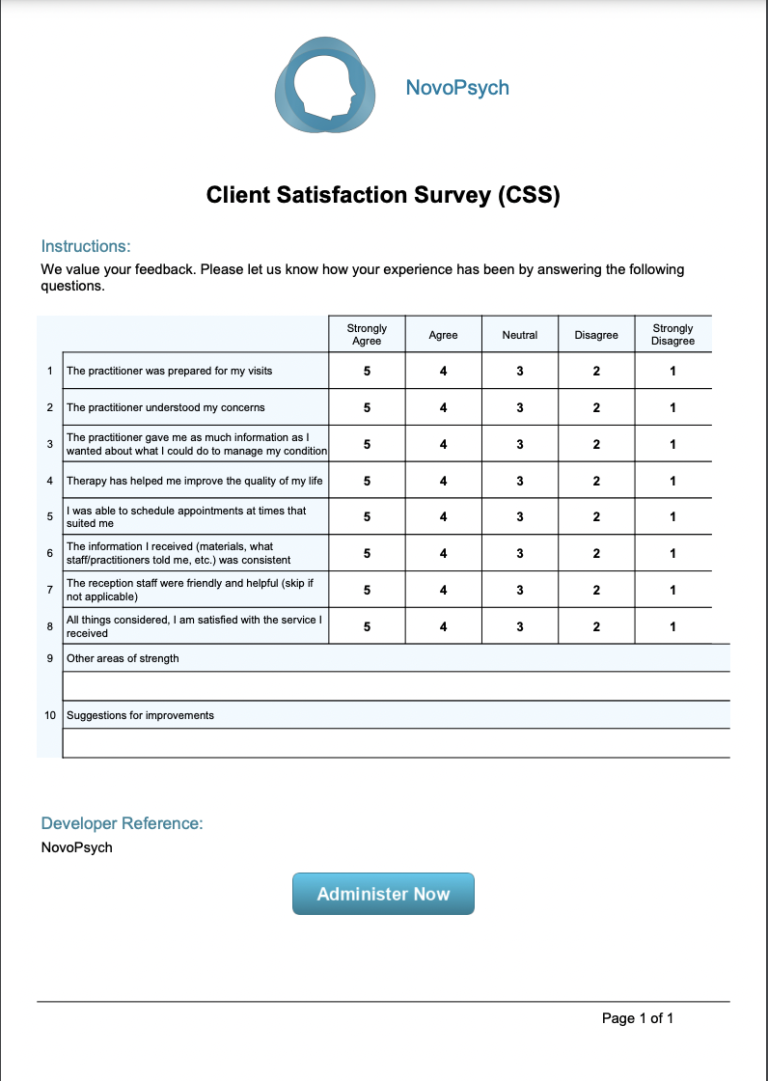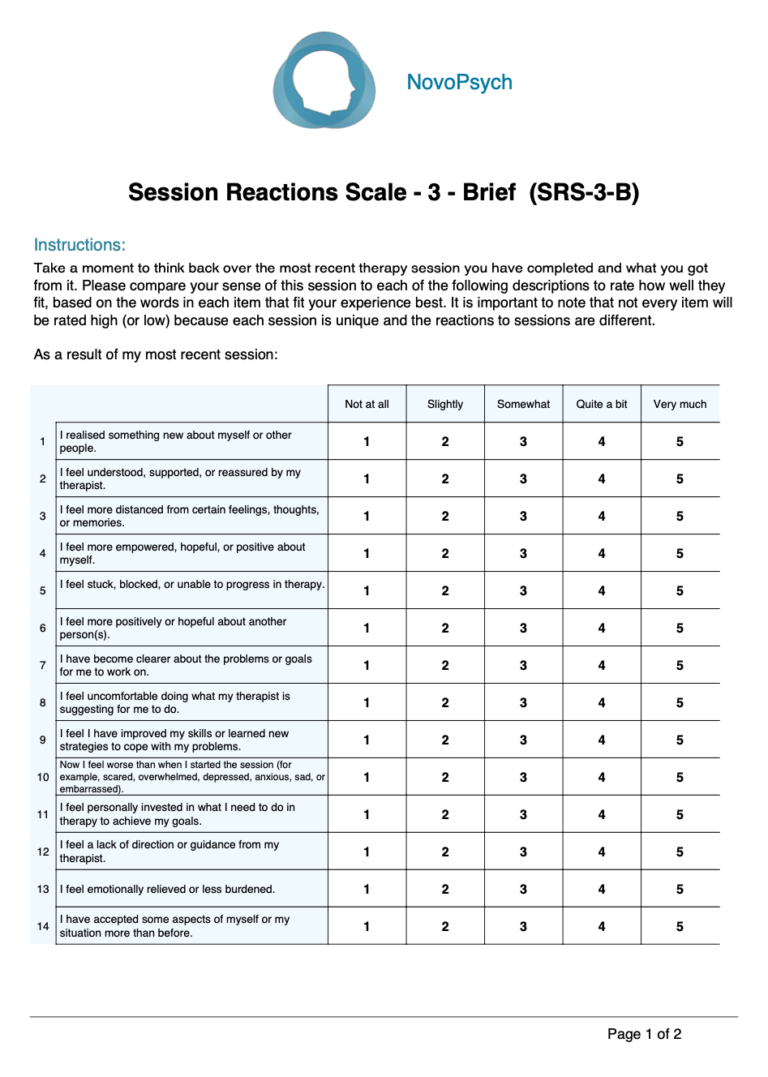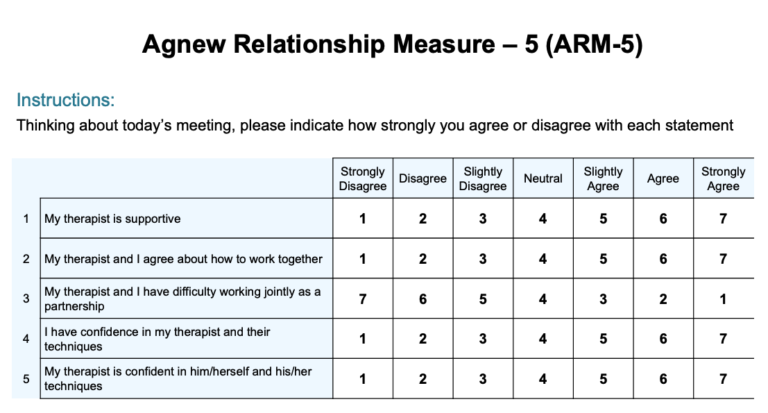NovoPsych is excited to introduce four essential assessments to assist clinicians engage in Feedback-Informed Treatment (FIT), ensuring that your service is even more finely tuned to your clients’ needs. These assessments have been carefully selected to empower you with systematic feedback, progress tracking, and a client-centric approach.
- Agnew Relationship Measure (ARM-5)
- Client Satisfaction Scale (CSS)
- Session Reactions Scale – 3 – Brief Version (SRS-3-B)
- Your Experience of Service (YES)

Feedback Informed Treatment (FIT) is an evidence-based approach within the field of psychotherapy that systematically and routinely seeks feedback from clients regarding both the therapeutic alliance (how well client and therapist are working together) and client outcomes (how well the client is doing). By incorporating real-time feedback from clients, clinicians can better tailor therapy to individual needs, thereby improving outcomes and reducing dropout rates.
The main components and principles of Feedback Informed Treatment include:
- Routine Measurement of Therapeutic Alliance: The core principle of FIT is the emphasis on systematically measuring the therapeutic relationship. Research has consistently shown that the quality of the therapeutic alliance is a primary predictor of treatment outcome. By obtaining feedback on the alliance, clinicians can address any issues or ruptures that might hinder the therapeutic process. The Agnew Relationship Measure (ARM-5) is a widely used measure of therapeutic relationship from session to session.
- Progress Monitoring: As well as measuring therapeutic alliance, FIT typically involves measuring the progress of therapy with standardised measures. Progress can be defined in many ways, such as symptom reduction, valued living (ACT) or the balance of positive and negative affect.
- Real-time Adjustment: Using the feedback obtained, clinicians can adjust their interventions and approaches to better meet the client’s needs. If a client isn’t benefiting from therapy or the measures identify a problem in the therapeutic relationship, the therapist can recognise this early and modify their approach.
- Enhanced Collaboration: By actively seeking and valuing the client’s feedback, FIT can foster collaborative therapist-client relationships. Clients become active participants in their treatment, rather than passive recipients.
- Evidence-Based Practice: FIT aligns with the broader movement in mental health treatment and healthcare towards evidence-based practice. By using standardised measures and routinely monitoring outcomes, clinicians can ensure that their interventions are effective.
- Improved Outcomes and Efficiency: Research has shown that when therapist implement FIT they tend to have improved outcomes.
While Feedback Informed Treatment emphasises the feedback loop from individual client to therapist, the same principles can be used at a practice wide level to use feedback to improve the quality of a service. For example, therapists could measure client satisfaction at the conclusion of treatment using the Client Satisfaction Scale or Session Reaction Scale (SRS). This approach retains many of the benefits of FIT without inserting it into the therapeutic process itself.
Feedback Measures
Client Satisfaction Scale (CSS)
The CSS measures the level of satisfaction a client has with a mental health service such as psychology private practice, both satisfaction with their practitioner and their experience in general. It has eight questions measuring satisfaction in four domains:
- Satisfaction with the practitioner
- Reception staff (optional)
- Service availability
- Quality of life improvements
It is designed to be administered at the end of an episode of care, and scores are benchmarked against a sample of outpatient psychology clinics (Buchanan & Hegarty, 2023), giving practices a measure of their relative strengths and weakness compared to other practices.
Session Reactions Scale – 3
Brief Version (SRS-3-B)
The SRS-3-B is a 15-item self-report post-session measure for collecting systematic feedback on clients’ perception of a therapeutic relationship (Řiháček et al., 2023).
The assessment tool that can provide the clients’ perspective across two subscales:
- Helpful Reactions to Sessions – gaining a new perspective, feeling more empowered, hopeful or positive, and having clear goals to work on.
- Hindering Reactions to Sessions – feeling stuck, feeling uncomfortable about what the therapist is suggesting, and feeling there is a lack of direction or guidance from the therapist.
Your Experience of Service
The Your Experience of Service (YES) assessment is a tool used to measure a client’s experience of mental health care and is a frequently used measure for assessing service levels in government health departments. The YES was developed by the Secretary to the Department of Health (Victoria).
Agnew Relationship Measure (ARM-5)
The ARM-5 is widely used by clinicians engaging in Feedback Informed Treatment and is a self-report measure designed to assess client-therapist alliance. Given that therapeutic alliance is among the best predictors of treatment success, this tool can help clinicians identify risk of dropout as well as track any ruptures/repairs in the alliance. The ARM-5 has been shown to be equivalent to other scales such as the Session Rating Scale (SRS) in terms of predicting client outcomes, and measures three domains:
|





